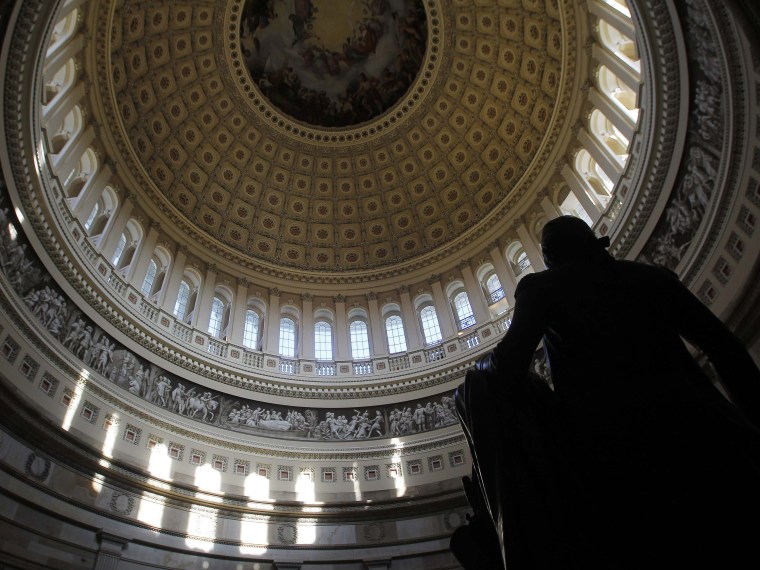When the U.S. Supreme Court gutted the Voting Rights Act in a highly controversial 5-4 ruling, the court's conservative majority effectively ended federal oversight of areas with history of voter-discrimination laws. If officials in those areas wanted to change their voting laws, the Voting Rights Act required pre-clearance from the Justice Department.
In Shelby County v. Holder, the high court's conservatives scrapped the requirement and challenged Congress to come up with a new formula for determining which areas deserved extra federal scrutiny of their voting laws, and which didn't.
In the six years that followed the ruling, state Republican officials wasted little time in taking advantage of the new legal landscape -- new voter-suppression measures passed in much of the country -- but federal lawmakers did not take up the Supreme Court's challenge and made no effort to create new standards.
Today, as Vox's Ella Nilsen explained, that changed.
Six years after the Supreme Court stripped key parts of the landmark 1965 Voting Rights Act, America's signature legislation protecting voters of color, the House of Representatives passed a bill meant to restore those safeguards.In a mostly party-line vote, the legislation was approved 228-187. The Voting Rights Advancement Act, introduced by Rep. Terri Sewell (D-AL), is a key part of Democrats' agenda to expand voting rights. It would make it more difficult for states to discriminate against voters of color, and give the federal government a stronger ability to take action against states with a history of discrimination.
At the end of the voting on the House floor today, it was Rep. John Lewis (D-Ga.), a hero of the civil rights movement, who held gavel, adding symbolic weight to the circumstances.
Mother Jones' Ari Berman fleshed out the practical effects of the legislation: "It would initially cover 11 states: nine in the South, plus California and New York, which have more recently been found to discriminate against Latinos and Asian Americans. The bill would also require all states to get federal approval for election changes that are known to disproportionately affect voters of color, such as strict voter ID laws, tighter voter registration requirements, and polling place closures in areas with large numbers of minority voters."
The Voting Rights Advancement Act enjoyed unanimous support from the House Democrats voting today, but literally only one House Republican -- Pennsylvania's Brian Fitzpatrick -- supported the proposal. (The last time the chamber voted on the Voting Rights Act, in 2006, it passed 390 to 33. GOP politics has changed quite a bit since.)
Now that the bill has passed the House, it heads to the Republican-led Senate, where it will, of course, go completely ignored. That's discouraging for voting-rights advocates, but it also speaks to a larger truth that's often overlooked.
In Republican circles, the phrase "do-nothing Democrats" is echoed frequently, basically because Donald Trump demands it. Senate Majority Leader Mitch McConnell (R-Ky.) recently insisted that House Dems are in the midst of "a one-year vacation from any productive legislation."
Reality tells a very different story. As regular readers know, in every Congress, the House majority leadership, regardless of which party is in control, sets aside the first 10 available bill numbers. It's intended as a symbolic way to signal a party's top legislative priorities: H.R. 1 through H.R. 10 will reflect the leadership's most important goals.
So far this year, the House Democratic majority has passed its democracy-reform package (H.R. 1), the Equality Act to expand civil rights to LGBTQ Americans (H.R. 5), the Dream and Promise Act (H.R. 6), the Paycheck Fairness Act to address pay disparities between men and women (H.R. 7), a bill to expand background checks on gun purchases (H.R. 8), and a bill to address the climate crisis (H.R. 9). Today, they added the Voting Rights Advancement Act (H.R. 4) to the list.
House Dems have also passed bills to lower prescription drug costs, expand the Violence Against Women Act, and expand the Dream Act for young immigrants.
The Republican-led Senate, meanwhile, barely tries to do any legislating at all. Sen. Chris Murphy (D-Conn.) complained over the summer that Senate Majority Leader Mitch McConnell (R-Ky.) has "effectively turned the United States Senate into a very expensive lunch club that occasionally votes on a judge or two."
The same week, Politico ran a piece describing the upper chamber as a legislative "graveyard," adding, "The Senate standstill is frustrating even some in the GOP."
And yet, it's against this backdrop, as the Senate ignores literally hundreds of bills passed by the House, that Trump and his cohorts continue to insist that the only thing House Democrats care about is presidential impeachment.
As political lies go, this one's as ironic as it is ridiculous.
